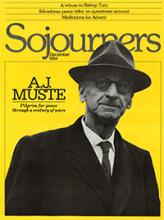Even now, almost 100 years after his birth, A.J. Muste's place in U.S. history is not easily pegged. Among other things Abraham Johannes Muste could be called the father of the nonviolent movement in the United States. He was involved in active non-cooperation with every American war in this century: World War I, World War II, Korea, Vietnam, and all the Cold War episodes and "police actions" along the way. He also pioneered the application of Gandhian techniques of nonviolent resistance and intervention to North American social struggles ranging from a major textile strike he helped organize in 1919 to incursions onto nuclear test sites and nuclear weapons bases in the 1950s and '60s.
Muste's career could also be placed in the long American tradition of "the public preacher," the prophetic figure who fearlessly points out the nation's sins and calls the people to repentance. An ordained Christian minister most of his life, Muste most often found his pulpit in the newspapers, the airwaves, and the streets. To many Muste was the conscience of the nation during some of the nation's meanest years.
Muste could also be remembered as one of the most insightful political analysts and theologians of his time. Few Americans, for instance, saw so soon or so clearly the inherent pitfalls of the foreign policy course America charted after World War II. And while Muste's doctrinal orthodoxy was not as rigorous as many might prefer, his record of unerring vision about the contemporary relevance of the gospel of Jesus would shame many of his more orthodox (or neo-orthodox) contemporaries.
Read the Full Article

